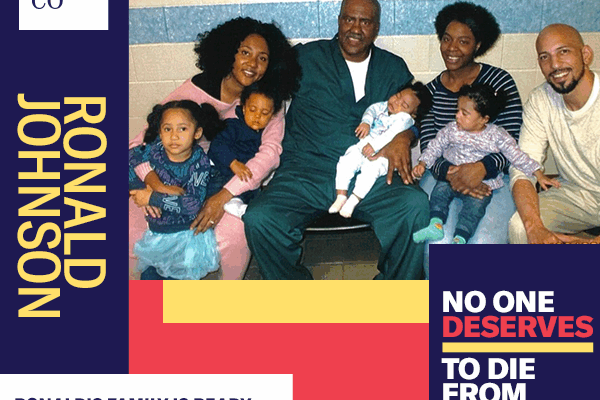Colorado's redemption campaign is working to safely bring home people incarcerated in Colorado's prisons.
For most people in state prisons, a governor’s grant of clemency — acknowledging their right to redemption — is the only chance they have of timely release and a pathway to healing.
Anthony Martinez
Anthony is 84-years-old and has spent 30 years incarcerated. In January 2021, he was finally released to live with his niece.
In January 2021, 84-year-old Anthony Martinez left his cell in Sterling after 30 years and met his niece Kelly for the first time. He is one of only four people granted clemency by Governor Polis. In the midst of this public health crisis, many more incarcerated people as vulnerable as Anthony, could and should be immediately released to safely live out their remaining years with family.
Ronald Johnson
Ronald Johnson is a 62-year-old father and grandfather who has turned his life around in prison after being convicted of non-violent offenses related to substance abuse.
James Cranfill
James Cranfill is a 62-year-old grandfather and Navy veteran incarcerated at the Trinidad Correctional Facility. He suffers from chronic inflammatory lung disease, a condition that puts him at grave risk of serious illness and death from COVID-19.
Due to his underlying health conditions, James applied for COVID-related Special Needs Parole but, because Governor Polis failed to renew the Executive Order granting the Colorado Department of Corrections the ability to release vulnerable incarcerated people, James remains in prison with no way out.
James has served seven years in prison for robbing a bank. He had no weapon, and no one was hurt. According to news reports, James walked into the bank, handed a piece of paper to the teller demanding money, the teller gave him the money and James left. He was later arrested after being identified in security footage. Though it does not justify his actions, James’ crime was non-violent, and driven by desperation and poverty.
“The crime was not committed with a motive of causing violence or hurting anyone,” said his son Will. “Though it sounds serious, his conviction was for a nonviolent offense. He felt this was the only way to provide for his family. My father is a Navy veteran who has overcome childhood trauma and worked to become a better person. He is a peaceful, loving man who knows what he did was wrong.”
Since his incarceration, James has worked to better himself and the prison community. James is a life-long artist who has painted murals inside several DOC prisons, including one of the antelopes grazing inside the psychiatric wing at the Trinidad Correctional Facility. James has also trained for eight weeks in the firefighting program and, following counseling for substance abuse, is proudly sober.
“My dad is a new man,” Will said. “He takes pride in creating beauty inside the DOC and that has given him purpose. He has so much to contribute to our community and our family. We just want him to come home.”
James' two children, Will and Faith, and two grandchildren, Aspen and Dottie, are eagerly awaiting his release and homecoming. “My dad lives in fear of becoming sick, especially since he has already served so much of his sentence, is medically vulnerable, has grandchildren who need him home and has contributed everything he has to DOC with his art,” said Will. “We all fear that his prison sentence will become a death sentence.”
John Peckham

John is an IT expert and nature enthusiast who requires breathing treatments several times a day, and lives in fear of dying in prison.
“I am a father and grandfather of three. I am scared about what will happen to me if I get COVID-19. I frequently wonder if I will get the chance to get out and meet my three grandchildren and be reunited with my other family members.”
--- John Peckham
John Peckham suffers from multiple chronic respiratory problems. He has already been hospitalized due to dangerously low oxygen levels and requires breathing treatments several times a day. In support of John's release, his doctor wrote, “I do not see how any correctional facility can fully protect him from COVID-19 and infection in his case would have dire consequences for the patient.”
Shortly after his parents’ deaths just months apart, John was evicted from his home. As a result of these emotional, financial and legal difficulties, he made a series of bad decisions. He has served five years for theft and becomes eligible for parole in 2023. According to his close friend Mark, “The fact that he got a twenty-year sentence for a non-violent crime reflects a problem with the criminal justice system. The truth is that in prison, you can’t social distance. If John becomes sick with COVID-19, he has little chance of surviving. That scares me.”
Before his incarceration, John had a good job, a passion for IT and loved spending time in nature. His friends describe him as smart, generous and deeply curious. While in prison, John has received certificates in multiple work training programs. John says, “Prison has humbled me greatly. I am zero risk to the public.” CDOC's own assessments confirm John does not pose a risk to the public and yet he remains in prison. John’s greatest fear is dying while incarcerated. He says, “If I’m going to go, I would rather go free on the outside than trapped behind these walls.”
Christine Nye
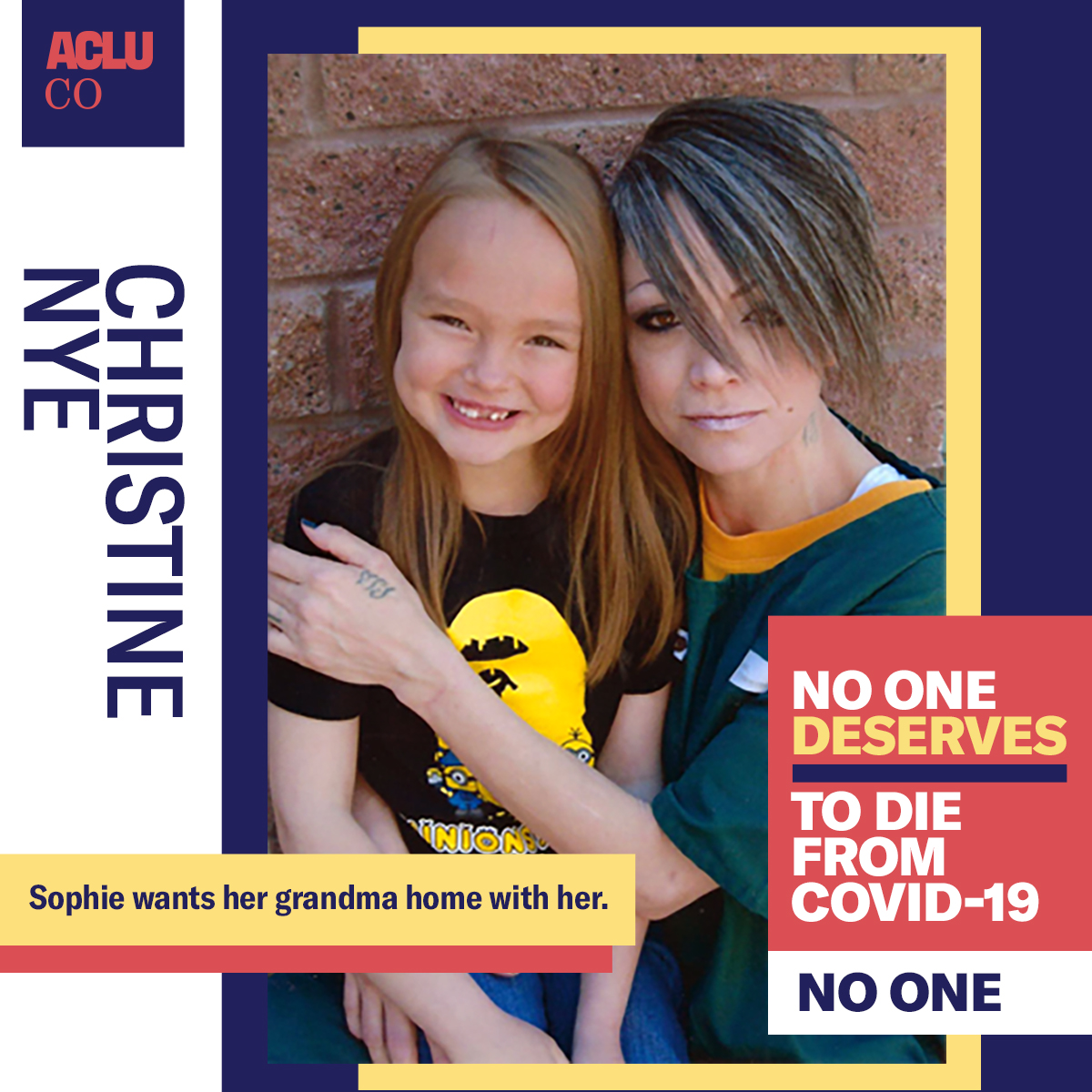
Chris is an accomplished artist, dog trainer, community leader and grandmother with severe asthma who is eager to rejoin her family.
Christine Nye, 48, has heart arrhythmia and severe asthma that has required her to use two inhalers since her late 20s. Ms. Nye arrived in prison as a young 20-year-old who had survived a traumatic life. In her nearly three decades behind bars, she has matured greatly and is now a talented artist who has a lead position in the print shop at Denver Women’s Correctional Facility (DWCF). She has also worked as an Offender Care Aide, helping incarcerated people with disabilities and medical conditions, and as a dog trainer. For many years, she participated in the Shape Up program to encourage juveniles to follow the law. She is currently a student in DWCF’s Culinary Arts Program and serves as Bureau Chief for the Inside Report, a prison newspaper. Ms. Nye participated in the Denver University Prison Arts Initiative’s December 2019 production of “A Christmas Carol,” serving as its scenic designer and technical director. For many years, she has painted murals and helped decorate prison visiting rooms for holiday celebrations to improve the experience of children visiting their incarcerated mothers. Ms. Nye has formally and informally volunteered as a peer mentor for many other women in prison. She has a strong family support system waiting to help her transition home. A devoted daughter, mother, and grandmother, Ms. Nye is more than her worst mistakes. She deserves a chance to be of service to her family and society. She doesn’t deserve to die from COVID-19.
Kevin Taylor
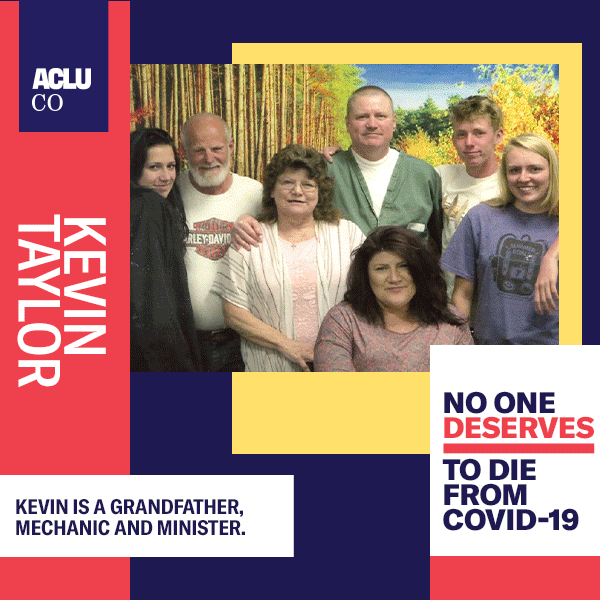
Kevin Taylor is a grandfather, mechanic and ordained minister incarcerated at the Colorado state Penitentiary, where COVID-19 is flaring up.
He suffers from a traumatic brain injury, as well as serious heart conditions which have required multiple surgeries and places him at a heightened risk of serious illness or death if he gets covid-19. Kevin’s family is desperate for his release. “If he gets COVID-19, I don’t know if he would survive with all his underlying medical conditions. I don’t want to lose my son,” says Barbara, Kevin’s mom.
Kevin has served nine years in prison for an assault that he greatly regrets. While under the influence of alcohol, he got involved in an altercation between his daughter and other men after witnessing her being abused by an older man. Barbara says, “He’s not a public safety risk. This happened because he wasn’t thinking straight and it’s a mistake for which he has taken full responsibility. After completing courses for substance abuse, he has been sober for the entirety of his prison sentence. I know this won’t happen again.”
Since incarceration, Kevin has worked to better himself and the prison. He has lived in an incentive unit for seven years, which requires excellent behavior. Kevin is employed full-time doing maintenance, plumbing and yard work in the prison. He also has been entrusted with a gate pass, which means he can leave the prison.
Barbara says, “He has turned his life around. His severe learning disabilities have always made it hard for him and he dropped out of school in eighth grade. Since his incarceration, he has earned his high school diploma and after years of Bible study, is an ordained minister."
His dad, Al, says, “His passion has always been working with his hands. He has been a mechanic for years and his former boss at Best Auto has said that he will hire him as soon as he is released. Even in prison, whenever something is broken, Kevin is the one they call to fix it.”
Kevin has a close-knit family including four siblings, a daughter and two grandchildren who look forward to welcoming him home. His family describes him as a loving, funny and loyal father and son. Al said, “I can’t describe the stress of having your son in prison. I just don’t want to die before Kevin comes home. I can’t think of anything that would mean more to this family than to have our boy home.”
Barbara says, “He would be a salvation if he came home. We need help with the house and yard and car. He was always the one to help us and it’s been a struggle without him. All I dream about is having my son stand in my living room and being able to put my arms around him and know he’s safe. We are asking for a second chance.”
Marcel
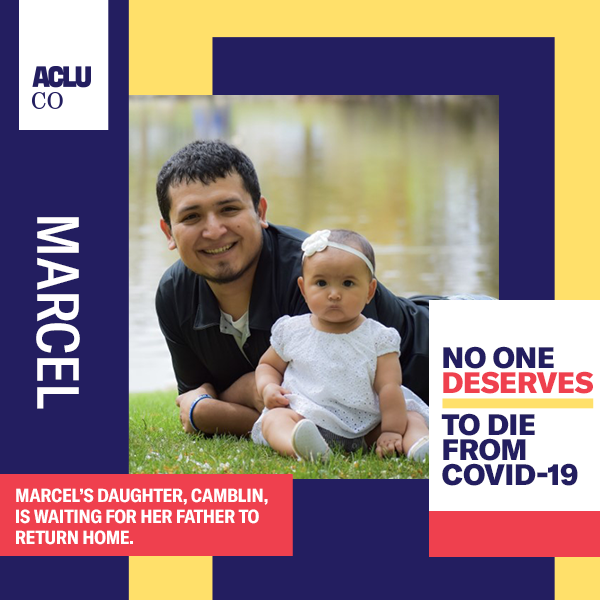
Marcel is a compassionate, loving father desperate to survive COVID-19 so he can hold his daughter once again.
Marcel has been in Sterling Correctional Facility — site of the state’s 2nd largest COVID-19 outbreak — since February 2020. He is scheduled for release in November, if he makes it out alive. Marcel is medically vulnerable because he has an arachnoid cyst in his head. He is at risk for blindness with this type of cyst and it is unknown how it would react to the virus. Marcel is unable to socially distance in his cell and feels there is not adequate access to medical care. His cellmate was sick and tested positive for COVID-19. As a result, Marcel and others were put in the hole for quarantine. While in the hole, inmates were refused cleaning supplies and the showers were not cleaned in between uses. Marcel stopped using the showers and bathed in the sink for fear of infection. With conditions at Sterling remaining status quo, it’s not a matter of if Marcel catches the virus but when. His mother Michelle is heartsick that Marcel’s daughter, Camblin, may never see her father again. No parent deserves to live with that fear.
Demika Rogers
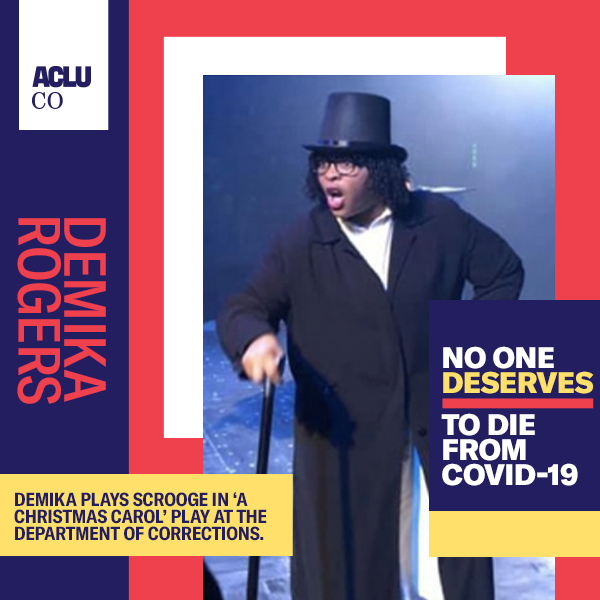
Demika is a talented chef, actor and founder of the Women of Influence program, who suffers from severe asthma and deserves a second chance.
Demika Rogers suffers from severe asthma and pre-diabetes which places her at a higher risk of mortality if she contracts COVID-19. Ms. Rogers came to prison as a 25-year-old woman and has since dramatically transformed herself into a leader who works to help others. For more than a decade, she has lived in the incentive unit at Denver Women’s Correctional Facility (DWCF), which requires her to maintain positive behavior and avoid disciplinary infractions. Ms. Rogers is a talented chef who worked in the culinary department at DWCF for many years. Currently, she works as a dog trainer. She has completed many rehabilitative programs and serves as a facilitator for the Alternatives to Violence Program and the founder of Women of Influence, a program that mentors women serving lengthy sentences. Ms. Rogers participated in the Denver University Prison Arts Initiative’s December 2019 production of “A Christmas Carol,” playing the lead role of Scrooge. She received many accolades for her performance, which was seen by several thousand people in multiple performances both within DWCF and in the community. She has proven herself to be responsible and ready to be a contributing member of society. Ms. Rogers doesn’t deserve to die from COVID-19. She deserves a fighting chance.
Michael Kaiser
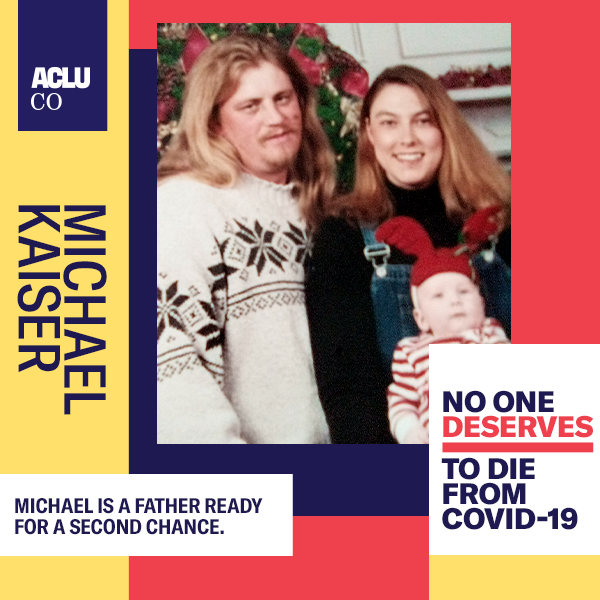
Michael Kaiser is a 47-year-old husband, father, and recovering addict who is incarcerated at Sterling Correctional Facility for a non-violent offense, even as COVID-19 tears through the prison.
Because of underlying medical conditions, including diabetes, high blood pressure, a high BMI and neuropathy in his feet, Michael faces a heightened risk of serious illness or death if he contracts COVID-19. His stepdad, Stephen, says, “Every day, we hear reports about how quickly COVID-19 is spreading in prison. Men with underlying conditions like Michael have already died in Sterling so we worry about him constantly. There is a good chance that if he gets COVID-19, he will die and that terrifies us.”
When Mike was 12 years old, he and a friend were playing in his apartment building, which caught fire. Mike ran into the burning building and rescued his friend but was severely burned. While recovering in the hospital burn unit, he was given morphine. By the time he was released, Mike was addicted to painkillers and has struggled with addiction his entire life. This battle with addiction culminated in his conviction for drug possession with intent to distribute.
Due to his underlying health issues and his incarceration for a nonviolent offense, he was approved for Special Needs Parole in the wake of COVID-19. Yet, he was not released because Governor Polis removed the authority of DOC to release vulnerable incarcerated people. Even as COVID-19 spreads through Sterling, Mike remains in prison.
Stephen said, “Substance abuse and addiction is hurting so many families. But the solution isn’t to throw people away in prison for years. That hurts families even more. It has caused so much pain for my wife and me that he’s serving this long sentence for a non-violent offense and we are robbed of a decade with our son.”
During his six years of incarceration, Mike has turned his life around. He has taken substance abuse courses and has learned the skills he needs to stay sober upon release. He has become a contributor to his prison community. Out of a desire to support his fellow incarcerated people who keep Kosher but had limited food options, he trained to become the only Kosher chef in Sterling. He has a spotless record with no disciplinary infractions.
Stephen said, “When he was first sentenced, he hit this really low point and he was forced to realize that he had messed up his life. I think a lot of people would have given up, but he has always been the most hardworking person I know. He has worked to become sober and is so proud to be free of addiction for the first time in his adult life. He understands that release would be a second chance and a salvation.”
Mike has a wife, two sisters and elderly parents eagerly waiting for his release. His family describe him as an extremely likable, intelligent and hard-working family man who is always willing to help other people. Before his incarceration, he ran a successful gutter company. He has a job lined up, a close support network and remains hopeful about his future upon release.
Stephen said, “At heart, he’s always been a good kid. He didn’t hesitate about running into a burning building. That’s the type of person he is. When we were getting married, our wedding venue fell through. Mike found us a new venue, saved the wedding and walked his mom down the aisle. When we moved into a new house, Mike painted the whole thing and moved us in. He was the one to come by to fix the car, mow the lawn and help around the house. His mom has COPD and is on oxygen 24/7 and I’m disabled with kidney disease. We need him home to care for us.”
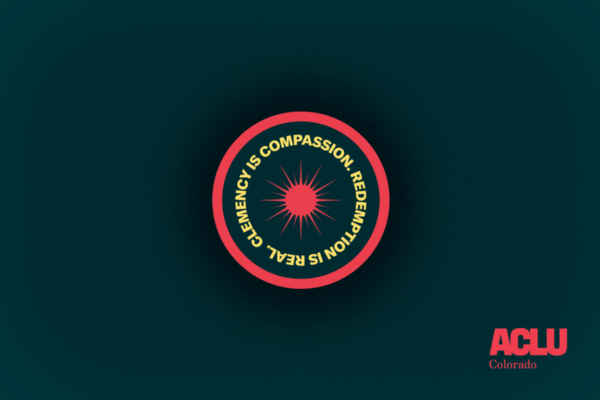
The COVID-19 pandemic has left many of us feeling powerless, especially families whose loved ones remain at-risk inside Colorado prisons. But there is something that you can do — share your story. One of the most effective ways to change hearts and minds, and urge Governor Polis to act, is through your personal experiences. By sharing your stories, you will help us better understand what is happening inside Colorado's prisons and join us in advocating for the safe release of our most vulnerable neighbors.
If you are willing to share your story please email [email protected]
We will use the information you provide to advocate for people who are incarcerated and protect civil liberties for all. Please note: e-mailing [email protected] does not offer or guarantee legal representation or advice.
If you are seeking legal assistance, please submit your complaint for review through our Online Form to Request Legal Assistance. Or, visit our Need Legal Help webpage.

